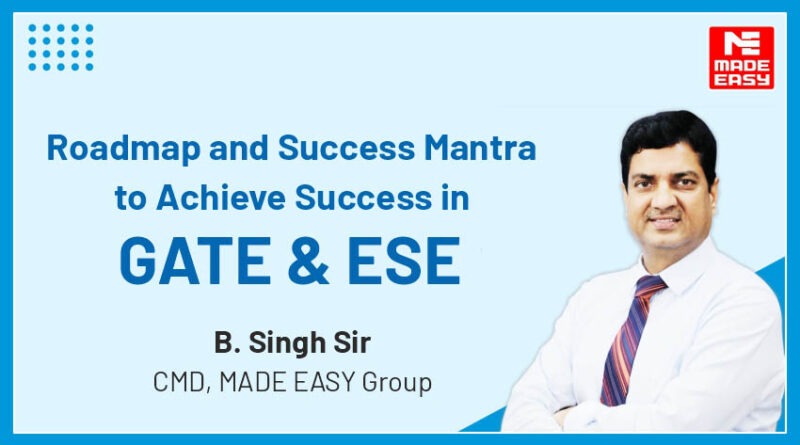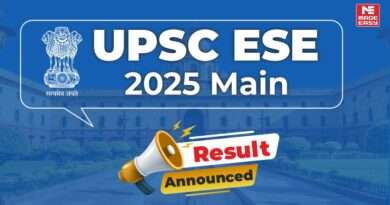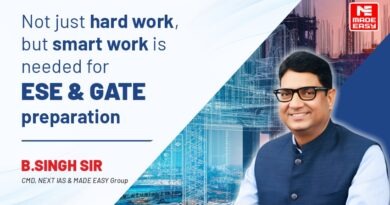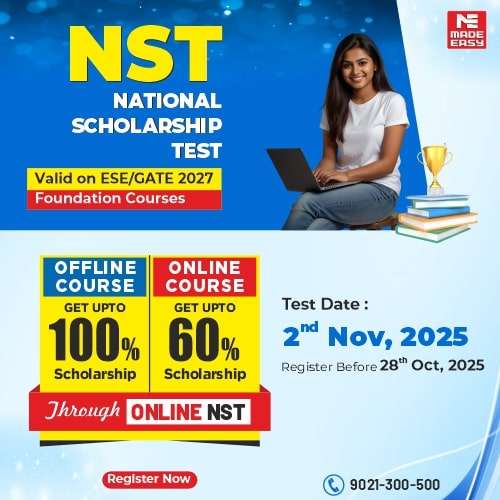Roadmap and Success Mantra to Achieve Success in GATE and ESE
‘From building the roads to the construction of Ram Mandir in Ayodhya, projects like the Central Vista Project or Developing AI are done by engineers. The engineering profession is the most versatile profession.’
The above statement reflects the confidence of our B. Singh Sir (Ex. IES; CMD – MADE EASY Group) while taking the live session with the viewers on MADE EASY official YouTube channel. He gave up his valuable time to engage with the audience during the webinar on February 21, 2024, and they had a fantastic conversation on the career opportunities available to those who choose to pursue engineering.
This blog provides you with our overview of the CMD Sir’s interactions with viewers, in which he explains how to achieve success in GATE and ESE. In addition to the GATE and ESE, he has discussed a number of post-engineering career possibilities. This conversation covers a wide range of exam-related subjects, from the fundamentals to exam preparation.
Our roadmap will assist you in achieving success in ESE 2025 and GATE 2025 or career developments in engineering, regardless of whether you want to start your journey for competitive exams or a fulfilling career in engineering.
However, it is highly advised that you view the video on MADE EASY’s official YouTube channel.
Career Options after B. Tech
Students who have planned ahead and are certain of their career choice after earning a B. Tech degree have a sense of relaxation. However, a lot of students are still unsure about their career choice. B. Tech students have four distinct sectors in which they might pursue careers that are either non-technical or technical:
- Government sector
- Private sector
- Higher studies
- Tech startup/ Business
Government competitive tests like GATE, ESE, SES, and others are available to engineers who wish to advance their career in a technical position. There are plenty of non-technical opportunities as well, such as State PCS, UPSC, and the civil services.
The annual Graduate Aptitude Test in Engineering is a technical exam that serves as a gateway for engineers. We are aware that passing the GATE exam provides candidates with access to employment in PSUs and numerous other government sectors, as well as opportunities for further education. Moreover, the GATE syllabus serves as a valuable resource for other state engineering exams, given their similarity to GATE’s technical syllabus. Incorporating fewer subjects like engineering aptitude and general studies will broaden the preparation for the exam like SES, BARC, DRDO, and many others. The primary motive for preparing for such competitive exams is a secure job and so the preparation should be holistic.
*For more detailed interaction about GATE and its pattern, watch the video linked, GATE.
*Click on the link to learn more about Graduate Aptitude Test in Engineering (GATE)
ESE- Engineering Services Examination is a central government exam held by UPSC annually to hire for Group “A”. A lot of departments rely on the ESE for recruitment, including CPWD, CWC, GSI, IDSE, and others. Since CMD Sir has made reference to fewer departmental additions in ESE, students aspiring to work in technical positions with Indian Railways should view the video.
*For more detailed interaction about ESE and its pattern, watch the video linked, ESE.
*Click on the link to learn more about the Engineering Services Examination (ESE)
There is no annual exam frequency for SES-State Engineering Services exams. Exams are administered in various states either once a year or not at all. Thus, the exam notification cannot be expected in a specific month. However, the exam is held in three to four months after the notification is issued. Thus, it would be incorrect to wait for the notification before beginning your preparations. Starting with your preparation in the third or final year of the exam is the most effective and secure course of action. The SES curriculum is very similar to the ESE curriculum, with the addition of geography, history, politics, and current events, as well as particular state information. Therefore, it is strongly advised that you begin the preparations beforehand.
*For more detailed interaction about SES and its pattern, watch the video linked, SES.
Examinations such as UPSC, CSE, IFOS, EPFO, CDS, CAPF, and State PCS primarily focus on General Studies and are non-technical in nature. In contrast, exams like CAT, Banking, SSC-CGL, GRE, GMAT, and TOEFL primarily assess aptitude and English proficiency.
*For comprehensive knowledge, it is highly recommended to watch the video linked. https://youtu.be/NgCCNGreucA?t=1710
Let’s now have a quick discussion regarding test preparation, including note-taking techniques, study materials, and strategy and planning.
Competitive Exam – Preparation
Mr. B. Singh has shared his extensive experience and knowledge by providing valuable tips for preparing for competitive exams. According to him, there are four essential components to consider when preparing for such exams.
In order to focus your preparation and efforts appropriately, it is crucial that you have a thorough understanding of both the exam and yourself. Then, a good study source should consist of books and notes that contain nothing less than or beyond the syllabus. It’s also crucial to have discipline, planning, and a strategy. One of the most important parts is regular practice and assessment of the material you have learnt.
1. Source of study
As said, the resources to study must have everything that is in the syllabus. The plus point of the GATE and ESE syllabus is that it is defined very well. It is, therefore, necessary for candidates who are preparing or are anticipating to have one excellent book per subject; it should be up-to-date and free of errors. Self-written notes are also the most important study tool. They should be comprehensive and useful, flexible in case further changes are needed, and updated. Aspirants preparing for non-technical exams must read newspapers and magazines.
Note: Click on the link below to learn the most effective way of note-making. https://www.youtube.com/watch?v=NgCCNGreucA&t=4254s
2. Strategy and Planning
Overall planning is crucial, but approaches can be significantly different between fresher and repeater candidates. Since each subject is unique, planning on a subject-wise basis can be highly effective. Instead of weekly or monthly planning, daily planning tends to be more effective. It’s important to plan your next 24 hours effectively to prevent unnecessary time wastage, especially on social media
Note: During the live session, CMD Sir gave a quick introduction to the En.C.-Engineering Concepts Program. Click on the link to get detailed information about it, especially for the engineering students of 1st, 2nd, and 3rd years. https://youtu.be/NgCCNGreucA?t=6017
3. Test Series and Evaluation
Test series may assist you in identifying your areas of weakness. It evaluates performance and identifies areas of weakness. A test series adds value to your preparation process. It is highly recommended to create an exam environment and conditions to attempt the test series. If the exam contains negative marking, like the GATE and ESE, one rule to follow when taking any competitive exam is to avoid making blind guesses.
Memory Techniques for Efficient Study
HERMANN EBBINGHAUS for getting a curve
HERMANN EBBINGHAUS was a German psychologist who is known for discovering the forgetting curve. He tried to study the relationship between memory and time. How much one remembers within the time and forget within the time. CMD sir explained the forgetting curve and added an activated memory curve, encouraging aspirants to stimulate the brain cells for retention.
*For more detailed information about HERMANN EBBINGHAUS forgetting curve and the relationship between memory and time, watch the video linked. https://youtu.be/NgCCNGreucA?t=6542
Concluding the video and blog, advising aspirants to Believe They Can. The path involves daring to decide, exploring and starting, strategizing and planning, analyzing and identifying weaknesses, continuously learning and practicing, and re-planning and re-working, all of which eventually lead to success.
Dear Aspirants,
Your preparation for GATE, ESE, PSUs, and AE/JE is now smarter than ever — thanks to the MADE EASY YouTube channel.
This is not just a channel, but a complete strategy for success, where you get toppers strategies, PYQ–GTQ discussions, current affairs updates, and important job-related information, all delivered by the country’s best teachers and industry experts.
If you also want to stay one step ahead in the race to success, subscribe to MADE EASY on YouTube and stay connected with us on social media.
MADE EASY — where preparation happens with confidence.

MADE EASY is a well-organized institute, complete in all aspects, and provides quality guidance for both written and personality tests. MADE EASY has produced top-ranked students in ESE, GATE, and various public sector exams. The publishing team regularly writes exam-related blogs based on conversations with the faculty, helping students prepare effectively for their exams.





